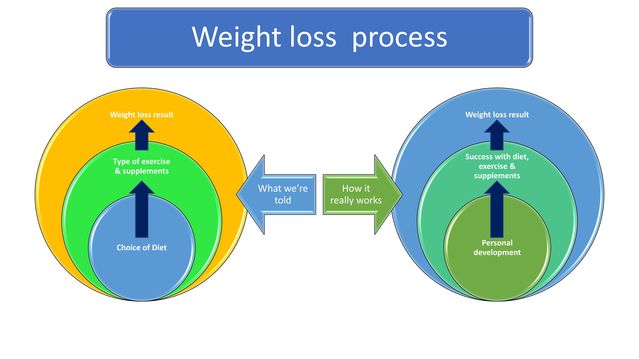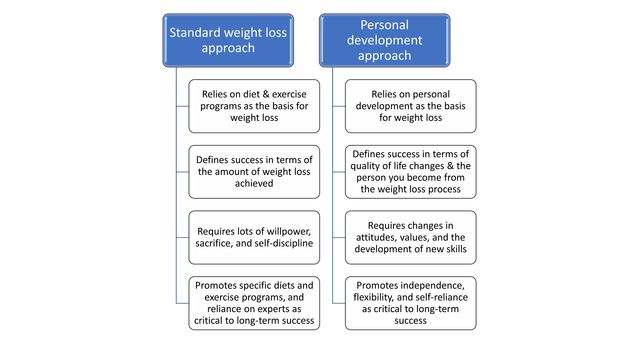Diet
Why Psychology Trumps Diet and Exercise for Weight Loss
Changing yourself is the most effective path to changing your results.
Posted July 24, 2019 Reviewed by Gary Drevitch
Yogi Berra, the Hall of Fame baseball player and occasional philosopher – once remarked that “Baseball is 90 percent mental. The other half is physical.” Although Berra was clearly not a mathematician, his statement about the importance of psychological factors in baseball rings true to anyone knowledgeable of the sport. Berra also lacked nutrition expertise, yet he could have made the same observation about the role of psychological factors in weight loss with no loss of accuracy.
In sports such as baseball, we tend to overestimate the importance of the external qualities of the athlete and equipment that we can see and touch, even when the internal mental factors are often equally critical to performance. So too in the practice of weight loss – for all the attention given to the latest diet or exercise trends – the qualities inside the individual are the primary determinants of success.
Decades of clinical trials show that neither the type of diet nor the type of exercise program contributes to weight loss beyond the short-term. This might seem difficult to believe based on social media posts and internet headlines that regularly proclaim the latest weight-loss breakthroughs.
The currently popular ketogenic (“keto”) diets, for example, are the subject of bestselling books, viral YouTube videos, and dedicated fan bases. However, clinical trials testing ketogenic diets suggest no superiority over other calorie-reducing diets, common side effects, and little evidence of long-term effectiveness. This criticism, however, is not unique to keto diets. With minor variability, the same conclusion is true for low fat, high fat, vegetarian, and high protein diets. Even the diets with the strongest evidence for their healthfulness – such as the Mediterranean Diet – have no special benefits for weight loss unless they also reduce calorie intake. Like the story of the man searching for his keys under the lamppost instead of in the dark alley where the keys were lost, weight loss efforts are frequently hindered by an excessive focus on diet and exercise-based solutions that bask in the light of popularity despite a lack of results.
Jim Rohn, the 20th-century business philosopher, used to describe what he called his “not much list” for financial success. Before his own rise to fortune, Jim focused on wealth solutions such as hoping for lower taxes, more generous employers, and lucky breaks. However, he later realized that the amount of difference made by these so-called solutions was “not much." Worse, these solutions made his success dependent on external factors over which he had little control. Instead of the “not much list," Rohn advocated personal development as the most effective plan for a better financial future.
Better philosophies, better attitudes, better skills, and better habits were the goals of his financial teachings, all focused on improving the inner qualities of the person to improve their outer results. While millions have reaped the benefits of Rohn’s financial wisdom over the years, “not much” solutions such as trendy diets, exercise programs, and supplements continue to dominate the weight-loss world.

Like baseball and finance, research on long-term weight loss shows that the foundation of success is personal development. People who achieve and maintain weight loss aren’t just physically different on the outside or even in the behaviors that one can observe; psychologically, they are even more different on the inside.
These include personal development areas such as improved relationships with food and exercise, new core beliefs, new values about health and fitness, and improved skills with confidence and self-motivation. These kinds of psychological changes, however, cannot be sold in pills, gyms, or diet plans and are therefore not marketed by the weight loss industry.
Research from the National Weight Control Registry has identified some of the major changes made by those achieving successful long-term weight loss. The NWCR boasts more than 10,000 members, comprised of adults achieving ≥30-pound weight loss for a year or more. Although the NWCR has published data about weight loss success since the 1990’s – capturing decades of weight-loss trends – no specific diet, type of exercise, or supplement has been found to predict long-term weight loss. Instead, the NWCR suggests that there are many weight loss solutions that are founded on sustained changes in behavior and lifestyle. The question raised by astute observers of the NWCR is what allows certain people to make lasting changes in health behaviors, whereas the majority regress back to old habits?

In the classic book, As a Man Thinketh, James Allen summarized the connection between thinking and health as follows: “A change of diet will not help a man who will not change his thoughts.” This insight is remarkable given that it was published in 1902. External behavior changes are the result of internal psychological changes. Healthier dietary and exercise choices result from ideas, values, beliefs, and emotions that promote and sustain healthier choices, and without them, these choices cannot endure.
Although these internal changes cannot be purchased or hacked, they can be developed. For those demoralized by histories of unsuccessful weight loss efforts, consider shifting your weight loss philosophy from seeing yourself as a person trying to lose weight to a person developing the inner qualities that make weight loss possible. And remember that Yogi Berra made the Hall of Fame practicing the baseball version of the same philosophy.




